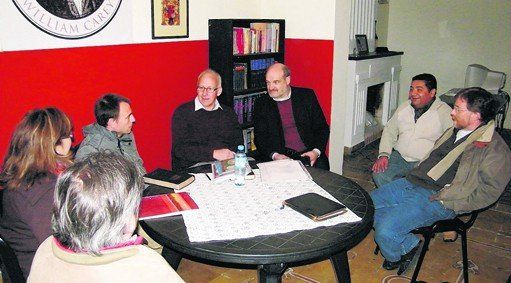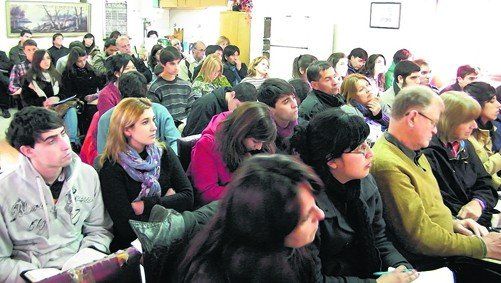A year ago we had talked with our home church pastor, Mostyn Roberts of Welwyn Evangelical Church, about the possibility of him visiting us in August 2013 to minister the Word of God to various Reformed Baptist churches with which we have built contacts over the last few years. He gladly accepted the invitation and the church kindly paid his air fare.

If you had been with us, you probably would have been struck by two things: the difference between each church and the churches’ isolation (due to the immense distances we had to cover, some 2300 miles).
We drove from our home in Tandil, 200 miles south of Buenos Aires, to the north-west and back again to visit five churches. Accompanying us was my brother-in-law, Daniel Rolls, as translator, and my wife, Lucy.
Villa Devoto and Rosario
The first stop was Villa Devoto, on the edge of the city of Buenos Aires. The church meets in a hall belonging to a club for retired people and is sandwiched between the city ring road and a feeder road.
The first meeting was on Friday 9 August, when Mostyn spoke on ‘What is an evangelical?’ and ‘What it means to be reformed’. On Saturday we had a four-session conference on ‘Justification and sanctification’.
Over 60 people were present for these meetings, and it was encouraging to see many of the young men who had attended previous conferences; also, to make new contacts with at least three pastors from churches that have discovered the doctrines of grace.
Immediately after the meetings, we were on the road heading westwards, a three-hour journey to Rosario, the third biggest city in Argentina. The small church there is pastored by two young men, one of them full time who has done theological studies.
They have come from a Charismatic background and are keen not to stifle the work of the Spirit in their worship. Consequently they lack something of structure and order in what they do.
Also, some familiar hymns are sung to their own peculiar versions of the original tunes, as no one reads music! Mostyn spoke, as they had requested, on ‘Perseverance and preservation’.
Cordoba and Catamarca
Monday also involved a lengthy journey, further west to Córdoba, Argentina’s second city. This proudly boasts the oldest university in the republic. We stayed with friends near the city, who feel rather isolated because of the poor condition of their local church — a recent preacher insisted that people make a decision for Christ with no need to understand what it meant, ‘because after the meeting I will explain what it means’.

Our friends had organised an extra meeting on Monday for us, which was attended by a heterogeneous group of believers from different churches.
Our main purpose was to visit a city-centre church that has progressively embraced the doctrines of grace and has a seminary that works mostly through the internet. Their keenest group of students is in Cuba and the pastor, Sam Masters, recently visited them.
The church also has two men preparing at Westminster Seminary, the plan being for them to return to work in the seminary. We heard about the work of the seminary and then spoke to the leaders.
This church, compared with others we visited, is well established. It has house meetings in various parts of the city, supports a missionary working in the north of the country and recently has seen a number of conversions.
Another long trip, something like six hours travelling northwards, to Catamarca, awaited us on Wednesday morning. Most of the area is scrubland, with little more than cactus, thorn bushes, prickly pear and goats. After crossing a large salt flat that extends for many kilometres, we began to see the Andean foothills in the distance.
Again we noted the differences between the churches. The pastor, Samuel Manfrotto, comes from a General Baptist church. He is also a consummate musician. The style of worship is traditional (hymns only, drum sets being anathema) and influenced by the American Baptist desire for choirs and choir robes!
But in four years, the church has grown from nil to 60, and a regular attendance of double that number. Mostyn spoke excellently on the two nights we were there, on the ‘Glory of God in missions’ and ‘Being sent as Jesus was sent’.
Tucumán
Friday came, and by this time we were looking forward to a completely free day. The final leg of our journey to Tucumán was the shortest of our trip. We had a scenic ride up through the mountains and down into an area famous for the cultivation of sugar, tobacco and lemons.
Pastor Raúl Oliva was waiting for us at the hotel and greeted us warmly. Here Mostyn spoke to the leaders on Saturday morning and then preached to the church in the evening, expounding two passages from Deuteronomy, and a third one on Sunday morning.
Monday was a bank holiday and the church gathered together for a day conference. Also the pastor and three members from Catamarca were present, having left their homes at 3.00am to be there.
Mostyn took the same themes as he began with ten days before, on the meaning of being evangelical and reformed, and also responded to questions.
I have been in contact with this congregation during the last three years and there is a consolidation in the membership, with a growing understanding of the implications of the doctrines of grace, as was shown during the question session.
The regular attendance is around 200. Pastor Oliva has a radio programme and ministry in other parts of Argentina. He has progressed from Arminian to Calvinist, via a period as an ‘apostle’.
In contrast to the church in Catamarca, the style of worship is more contemporary, but there is a seriousness about the folk and good listening to the Word preached. Raúl often preaches for more than 50 minutes.
Things in common
Despite some of the perceived differences, these churches have many things in common. Firstly, most of them are young churches enjoying a time of spiritual blessing. Secondly they share the 1689 Confession of faith. Thirdly, there is a need to strengthen contact between them, despite the distances involved.
Then, each church, in different ways, needs to think through how doctrine applies to all areas of church life, including worship.
One interesting feature is that they all seem to be attracting university students. This is perhaps not surprising, given the paucity of good teaching in most churches and the lack of a coherent world view amongst Argentine evangelicals — something only the Reformed faith can offer.
There is also a great need to strengthen expository preaching gifts. They all share the weakness of only one Sunday service.
God’s goodness
Mostyn Roberts spoke 20 times in 11 days, and was well served by Daniel Rolls in translating. The messages have been recorded and are mostly available on the internet.
Tuesday morning and Mostyn took the easy way back to Buenos Aires — and probably slept on the plane! But we had to drive a thousand miles before we got into bed at 4.00am the following morning.
We praise God for his immense goodness to us and his ample provision. Most of the churches shared in the cost of our ministry, which was very encouraging, and we enjoyed warm, Christ-centred fellowship everywhere we went. And we heard the Word of God clearly proclaimed, with passion and conviction.
Trevor Routley
grace4trout@gmail.com



